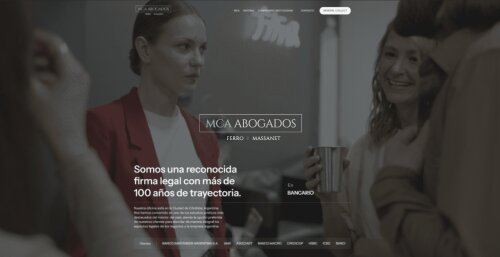Best Structured Finance Lawyers in Córdoba
Share your needs with us, get contacted by law firms.
Free. Takes 2 min.
List of the best lawyers in Córdoba, Argentina
About Structured Finance Law in Córdoba, Argentina
Structured finance refers to tailored transactions that repackage and redistribute financial risk - commonly through securitization, asset-backed structures, special purpose vehicles, and fiduciary trusts. In Córdoba, Argentina, transactions are governed by a mix of national financial and securities rules, federal civil and commercial law, and provincial regulations that affect registration, taxation and property matters. Local market participants commonly use instruments such as fideicomisos financieros, sociedades constituidas como vehículos de propósito especial, and asset-backed financings for real estate, receivables, leases and infrastructure projects.
Why You May Need a Lawyer
- Structuring and documenting complex transactions. Lawyers draft and negotiate trust agreements, issuance documentation, intercreditor agreements, security documents and service contracts.
- Regulatory compliance. Counsel ensures compliance with rules issued by national regulators such as the Comisión Nacional de Valores and the Banco Central de la República Argentina, and advises on whether registration or approvals are required.
- Tax planning and clearance. Structured financings have tax consequences at both national and provincial levels - lawyers coordinate with tax advisors to prevent unexpected tax costs or withholding obligations.
- Asset perfection and registries. Local counsel handles registration of mortgages, pledges, liens and other encumbrances in Córdoba registries to ensure enforceability and priority.
- Insolvency and creditor protection. Lawyers assess how proposed structures behave in debtor insolvency proceedings and design bankruptcy-remote vehicles when appropriate.
- Cross-border and foreign investment issues. If foreign investors, currency exchange, or cross-border payments are involved, specialized advice is needed to manage exchange control rules and international enforceability.
Local Laws Overview
- National framework: The Civil and Commercial Code and national corporate law shape fiduciary arrangements and company forms. Securities and public offerings are regulated by the Comisión Nacional de Valores - the CNV - and banking activity is regulated by the Banco Central de la República Argentina - the BCRA.
- Trusts and fideicomisos: The fideicomiso is a widely used vehicle in Argentina for holding assets and issuing securities. Trusts used in structured finance must be carefully drafted to allocate rights, cash flows and liabilities among parties.
- Securitization and offerings: When securities are offered publicly or to institutional investors, CNV rules may apply, including requirements for prospectuses, disclosure and registration. Some transactions are structured to be private placements to avoid public registration, subject to specific limits.
- Corporate and contract law: Special purpose companies - typically sociedades anónimas or sociedades de responsabilidad limitada - are used as SPVs. Contractual allocations such as service agreements, transfer and purchase agreements and true-sale opinions are critical.
- Insolvency regime: Argentine insolvency law governs creditor rights and restructuring procedures. The effectiveness of credit enhancement and bankruptcy remoteness depends on careful legal design and local court practice.
- Tax and provincial rules: National tax authority AFIP rules affect VAT, income tax and withholding obligations. At the provincial level in Córdoba, the Dirección General de Rentas and provincial property registries affect transfer taxes, stamp taxes and registration formalities. Municipal taxes may also apply.
- Registries and public recording: To secure real rights over assets located in Córdoba, registrations with the Registro de la Propiedad Inmueble and other provincial registries are required. Compliance with local formalities is essential to ensure enforceability against third parties.
- Exchange control and foreign currency: BCRA rules on foreign exchange may affect payments abroad, repatriation of proceeds and currency conversion. These rules frequently change, so up-to-date advice is important for cross-border flows.
Frequently Asked Questions
What is structured finance and how is it used in Córdoba?
Structured finance packages cash flows from assets or projects into tradable instruments or credit facilities. In Córdoba this often involves real estate securitization, receivables financing, project finance and fiduciary trusts that separate asset risks and allow access to capital markets or bank funding.
What is a fideicomiso and why is it common in Argentina?
A fideicomiso is a trust-like arrangement where a settlor transfers assets to a fiduciary for the benefit of beneficiaries. It is common because it provides flexibility to isolate assets, allocate cash flows, and serve as a vehicle for issuing securities or managing collateral.
Do I need CNV approval to issue asset-backed securities?
It depends on whether the issuance is a public offering or a private placement. Public offers usually require CNV registration and a prospectus. Private placements can avoid public registration if they meet specific regulatory exemptions and limits. Local counsel must verify regulatory triggers for each transaction.
How do I make sure security interests are enforceable in Córdoba?
Enforceability typically requires correct execution, compliance with formalities, and registration in applicable provincial registries - for example property registries for real estate mortgages or public registries for movable property pledges. Legal counsel will confirm the correct steps and documentation to perfect rights.
What tax issues should I expect in a structured finance deal?
Key tax concerns include VAT, income tax treatment of interest and principal, stamp and transfer taxes at the provincial level, withholding obligations and tax stability for investors. Early coordination with tax advisors and counsel reduces the risk of unanticipated tax burdens.
How does Argentine insolvency law affect structured finance?
Insolvency law can expose assets to creditors if the structure is not bankruptcy-remote. True-sale documentation, clear segregation of assets in a trust or SPV, and adherence to perfection rules help protect assets from upstream insolvency risks.
Can a foreign investor participate in structured finance transactions in Córdoba?
Yes, but foreign investors must consider foreign investment rules, possible BCRA exchange controls, tax implications and regulatory approvals. Structuring for currency risk and repatriation of proceeds is particularly important.
What is a special purpose vehicle and when is it needed?
An SPV is a company or trust created to isolate assets and liabilities for a transaction. It is commonly used to achieve bankruptcy remoteness, improve credit enhancement and meet investor or regulatory requirements.
How long does a typical structured finance transaction take?
Timelines vary widely. Small private financings can close in weeks, while securitizations, public offerings and complex infrastructure financings can take several months. Time is needed for due diligence, documentation, regulatory filings and registry formalities.
How much will legal advice cost for a structured finance deal?
Costs depend on complexity, regulatory work, cross-border issues, and negotiation needs. Budget items include due diligence, drafting, regulatory filings and coordination with tax and accounting advisors. Ask prospective lawyers for fee estimates and whether they charge fixed fees, hourly rates or milestone-based fees.
Additional Resources
- Comisión Nacional de Valores - national securities regulator - for rules on offerings and disclosure.
- Banco Central de la República Argentina - for banking regulation and foreign exchange rules.
- AFIP - Administración Federal de Ingresos Públicos - for national tax guidance and requirements.
- Dirección General de Rentas de la Provincia de Córdoba - for provincial tax matters and obligations.
- Registro de la Propiedad Inmueble de la Provincia de Córdoba - for property registration and searches.
- Colegio de Abogados de Córdoba - for locating licensed local lawyers and professional referrals.
- Bolsa de Comercio de Córdoba and local chambers of commerce - as market participants and information sources on local capital markets.
- Law faculties and research centers at Universidad Nacional de Córdoba - for academic resources and publications on finance law.
Next Steps
- Assemble basic information: prepare summaries of the assets, cash flows, parties involved, and the commercial objective of the transaction.
- Seek an initial consultation with a Córdoba-based lawyer experienced in structured finance. Provide them with the information you assembled so they can identify legal, tax and regulatory issues early.
- Order targeted due diligence: title searches, contract reviews, corporate status checks and regulatory compliance checks.
- Coordinate tax and accounting advice alongside legal counsel to design a tax-efficient and compliant structure.
- Plan for registry steps and timeline. Identify which registrations, filings and approvals are required at the national and provincial levels.
- Obtain written cost and timeline estimates from your legal team and define milestone deliverables for the transaction.
Important note - This guide is informational only and does not constitute legal advice. For binding advice tailored to your situation consult a qualified lawyer licensed to practice in Córdoba, Argentina.
Lawzana helps you find the best lawyers and law firms in Córdoba through a curated and pre-screened list of qualified legal professionals. Our platform offers rankings and detailed profiles of attorneys and law firms, allowing you to compare based on practice areas, including Structured Finance, experience, and client feedback.
Each profile includes a description of the firm's areas of practice, client reviews, team members and partners, year of establishment, spoken languages, office locations, contact information, social media presence, and any published articles or resources. Most firms on our platform speak English and are experienced in both local and international legal matters.
Get a quote from top-rated law firms in Córdoba, Argentina — quickly, securely, and without unnecessary hassle.
Disclaimer:
The information provided on this page is for general informational purposes only and does not constitute legal advice. While we strive to ensure the accuracy and relevance of the content, legal information may change over time, and interpretations of the law can vary. You should always consult with a qualified legal professional for advice specific to your situation.
We disclaim all liability for actions taken or not taken based on the content of this page. If you believe any information is incorrect or outdated, please contact us, and we will review and update it where appropriate.









